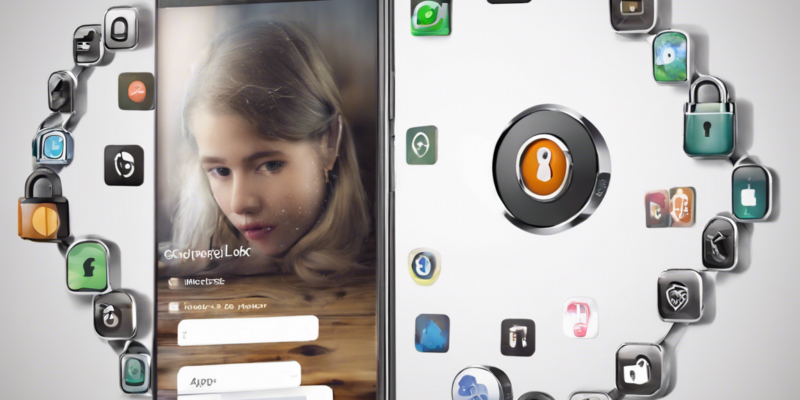In the digital age, security and privacy are of utmost importance. With the increasing reliance on mobile applications for various tasks, it is crucial to ensure that the information stored in these applications remains confidential and secure. One way to enhance the security of your apps is by using an app lock. App lock is a feature that allows you to restrict access to specific applications on your device with a password, PIN, pattern, or fingerprint. In this article, we will discuss how you can effectively use app locks to enhance the security and privacy of your applications.
Understanding App Lock
App locks provide an additional layer of security to your applications by requiring a password or other authentication method before granting access. This feature is particularly useful when you want to protect sensitive information stored in certain apps from unauthorized access. App locks can be used for various purposes, such as securing messaging apps, banking apps, social media apps, or any other application containing personal or confidential data.
Types of App Locks
There are different types of app locks available, each offering varying levels of security and features:
1. Password/PIN
The most common form of app lock requires users to enter a password or a PIN to unlock the application. This method is simple and effective, but it is essential to choose a strong and unique password to prevent unauthorized access.
2. Pattern Lock
Pattern locks involve drawing a specific pattern on a grid of dots to unlock the application. Patterns can be more convenient to use than passwords, but they may not offer the same level of security.
3. Fingerprint Lock
Many modern devices come with fingerprint sensors that allow you to unlock apps using your fingerprint. Fingerprint locks offer a convenient and secure way to protect your applications.
4. Face Lock
Some devices also support face recognition technology for app locks. This method uses facial recognition to grant access to the application, providing a convenient and secure authentication option.
Steps to Secure Your Apps with App Lock
Now that you understand the importance of app locks let’s discuss how you can effectively secure your apps using this feature:
1. Choose the Right App Lock Application
There are various app lock applications available on app stores, each offering different features and levels of security. It is essential to research and choose a reputable app lock application that fits your requirements.
2. Set Up App Lock
Once you have selected an app lock application, follow the instructions to set it up on your device. You can typically customize the settings, such as choosing the authentication method (password, PIN, pattern, fingerprint, face recognition), selecting the applications to lock, and setting timeout options.
3. Lock Your Sensitive Apps
Identify the applications on your device that contain sensitive information and lock them using the app lock feature. This may include banking apps, messaging apps, email apps, or any other application that stores personal or confidential data.
4. Use Strong Authentication Methods
Ensure that you use strong and unique passwords, PINs, patterns, or biometric authentication methods for your app locks. Avoid using easily guessable passwords and regularly update your authentication credentials for enhanced security.
5. Enable Auto-Lock
Most app lock applications offer the option to automatically lock the apps after a certain period of inactivity. Enable this feature to ensure that your apps are always protected, even if you forget to manually lock them.
6. Regularly Update the App Lock Application
Like any other software, app lock applications receive updates to improve security and functionality. Make sure to regularly update the app lock application on your device to benefit from the latest security patches and features.
Advantages of Using App Lock
Using app locks can provide several benefits in terms of security and privacy:
-
Enhanced Privacy: App locks help protect your sensitive information from prying eyes, ensuring that only authorized users can access the applications.
-
Secure Data: By locking specific apps, you can prevent unauthorized access to your data, reducing the risk of data breaches or leaks.
-
Parental Control: App locks can be used to restrict access to certain applications, making them useful for parental control to limit children’s usage of specific apps.
-
Protection Against Theft: In case your device is lost or stolen, app locks can prevent unauthorized access to your applications and data, adding an extra layer of security.
Frequently Asked Questions (FAQs)
1. Can app locks be bypassed?
While app locks provide an additional layer of security, like any security measure, they may not be entirely foolproof. However, using strong authentication methods and regularly updating the app lock application can help enhance security and make it more challenging for unauthorized users to bypass the lock.
2. Can app lock applications see my data?
Reputable app lock applications do not have access to your data. They only provide the functionality to lock the applications on your device and do not access or store the information within the locked apps.
3. Can I use multiple authentication methods with app locks?
Some app lock applications allow users to set up multiple authentication methods, such as using a password along with fingerprint or face recognition for added security. Check the features of the app lock application you choose to see if it supports multiple authentication methods.
4. Do app lock applications drain the battery?
App lock applications typically consume minimal battery power as they run in the background and only become active when you lock or unlock an application. However, it is essential to choose a well-optimized app lock application to minimize any impact on battery life.
5. Are app locks available for both Android and iOS devices?
Yes, app lock applications are available for both Android and iOS devices. You can find a variety of app lock applications on Google Play Store for Android devices and the App Store for iOS devices.
In conclusion, app locks are a valuable tool for enhancing the security and privacy of your applications. By following the steps outlined in this article and adopting best practices for app lock usage, you can safeguard your sensitive information and control access to your applications effectively. Remember to choose a reliable app lock application, use strong authentication methods, and regularly update the application for optimal security.


